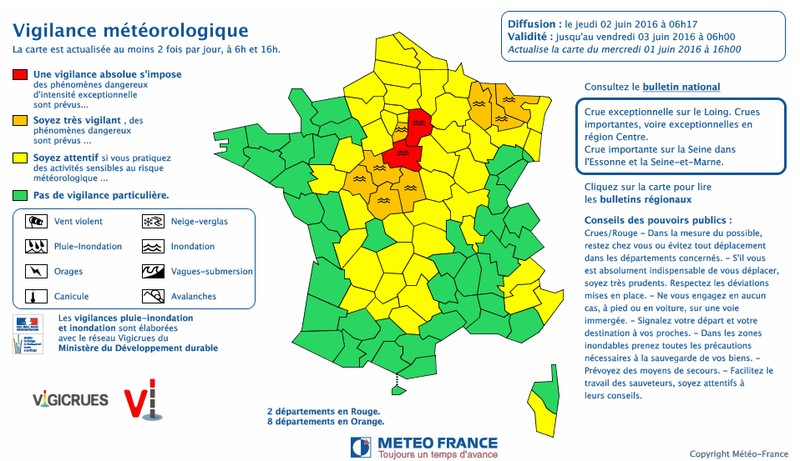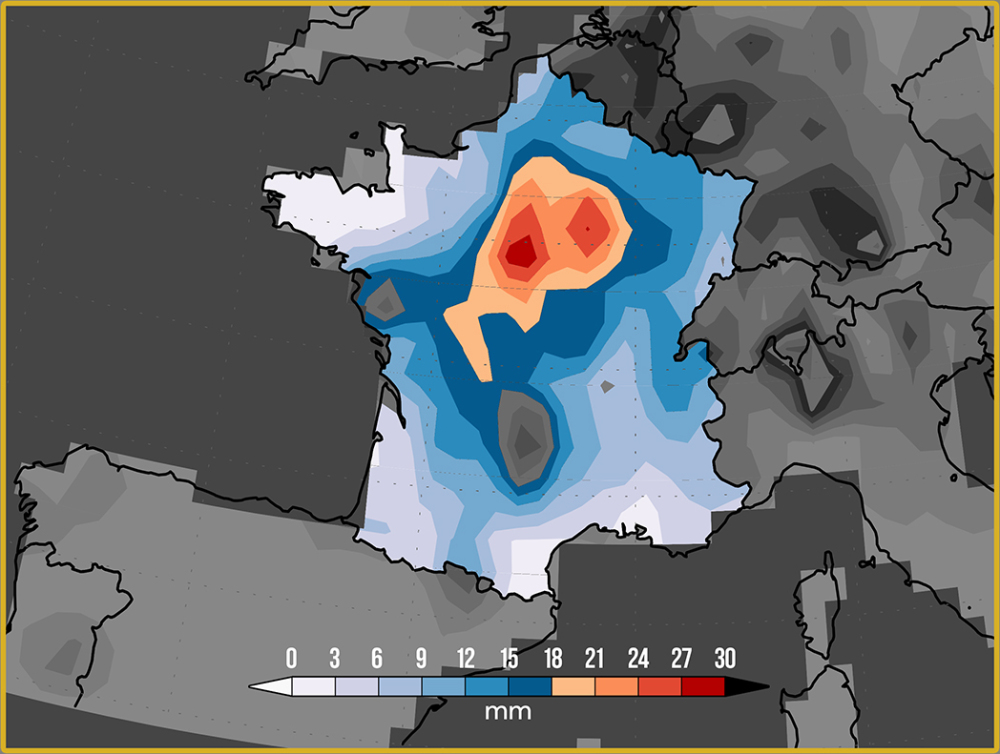Multiple Authors
09.06.2016 | 4:13pmJust a few days after the heavy rain that caused widespread flooding across northern Europe, scientists are already able to tell if it had been influenced by human-caused climate change.
A warming climate made the exceptionally wet weather in Paris and the surrounding region 80-90% more likely, preliminary findings suggest.
Germany also experienced heavy rain, but the fingerprint of human-caused climate change is less clear cut, say scientists at the World Weather Attribution project.
French flooding
The clean-up operation is still going on in Paris as the city grapples to deal with weeks of exceptionally heavy rain and flooding. The French capital city was hit by torrential rain in late May and early June, as a low pressure system swept across France, Germany and Austria.
French state forecaster, Météo France, confirmed May 2016 as the rainiest month since 1886, with some regions around Paris receiving up to six weeks’ worth of rain in three days and river levels in areas south of Paris swelling to their highest in 100 years.

On 2 June, two red and eight orange flood alerts were in place in central and north eastern France. Source: Météo France.
In central Paris, the River Seine reached 6.1m high – its highest level for 30 years – with two of Paris’ biggest museums, the Louvre and the Musee d’Orsay, being closed to give staff time to move artworks out of the basement and to the safety of the upper floors.
Across France as a whole, the floods caused at least four deaths, with thousands of people evacuated and 25,000 left without power. French President Francois Hollande declared a state of emergency and said the government would provide emergency funding to help local authorities deal with flood damage.
The Association Française de l’assurance (AFA) – the principal trade association for French insurance companies – says they expect around 150,000 insurance claims from the flooding, and estimate the damage at as much as €1.4bn.
Upping the odds
The team of researchers used several different methods to identify any potential link between the heavy rains and climate change, including comparing rainfall with past records and running thousands of simulations of possible weather with a regional climate model.
They looked specifically at whether or not climate change had affected rainfall totals over three-day periods. The map below shows the result across France for 29 – 31 May, the three-day period with the highest total. The red shading shows the heaviest rainfall occurred over and around Paris.

Map of mean rainfall (in mm) for the 3-day period from May 29 – 31, 2016 over France. Red shading indicates areas of heaviest rainfall. Source: NOAA/NCEP/CPC.
The team’s results suggest that climate change increased the likelihood of the heavy rainfall across France as a whole by at least 40%. Looking at individual regions, the influence of climate change was even more pronounced – an 80% increase for the River Seine and a 90% increase for the River Loire.
These types of “single event attribution” studies are becoming more common, as scientists seek to better understand the role of climate change in altering the odds of extreme weather. Dr Heidi Cullen, chief scientist at Climate Central and head of the World Weather Attribution program, tells Carbon Brief:
The team took about a week to turn the handle on this analysis, which is extremely fast in the science world. The speedy turnaround is important for connecting the potential dots between climate change and extreme weather while an event is still going on.
As Dr Peter Stott, head of detection and attribution at the UK’s Met Office, told Carbon Brief in our recent in-depth look at the science behind attribution:
Inconclusive
Germany, as well as France, bore much of the brunt of the heavy rains, with the southern regions of Baden-Württemberg and Bavaria particularly affected by flooding.
But analysing the extreme scenes was less straightforward than for Paris, says Dr Karsten Haustein, a climate systems and policy researcher at Oxford University. He explains:
France’s problems were largely caused by rivers bursting their banks, whereas thunderstorms dropped a lot of rain in mountainous terrain in Germany, leading to flash floods, he says.

Map of 1-day maximum rainfall total (in mm) up to June 5th, 2016 over Germany. Source: NOAA/NCEP/CPC.
The results ended up being inconclusive for Germany, says Dr. Geert Jan van Oldenborgh, a researcher with KNMI who led the analysis. He explains:
For this reason, the scientists are holding off saying anything definitive about climate change’s role in the recent heavy rains in Germany.
In the field of attribution, all types of results are needed to build a complete picture – positive, negative and inconclusive. The authors plan to submit a scientific paper to the journal Hydrology and Earth System Sciences (HESS) soon, with more details on their results for both countries.
-
Paris deluge made up to 90% more likely by climate change, scientists say

